RHODESIA - A Portrait in Black and White
By Time's Nairobi Bureau Chief Lee Griggs dated, April 12. 1976
Time is slowly running out for white rule in Rhodesia. An intensive campaign by exiled guerrillas may be months off, but the chances of finding a peaceful path to equitable power sharing between the country's 278.000 whites and 6.1 million blacks now appear to be spent. Negotiations between Rhodesia's white Prime Minister, Ian Smith, and the country's leading black moderate, Joshua Nkomo, have collapsed. Britain's offer to resume transitional control of its breakaway colony, predicated on elections leading to black majority rule within two years, was summarily rejected by Salisbury.
Last week Zambia's President Kenneth Kaunda. Black Africa's most moderate spokesman, called on Britain to intervene with military force if necessary, arrest Smith and his "gang of illegitimates and replace the white government with a British-led multiracial committee including representatives of the guerrilla factions as well as respected Rhodesian whites to prepare for one-man, one-vote elections. There was little hope his plea would be heeded, but his blunt language was a clear measure of widespread African frustration about how to deal with a country that, as Time's Nairobi Bureau Chief Lee Griggs found last week, seems increasingly out of touch with reality—and with itself.
In the upper-class white Salisbury suburb of Highlands on a sunny Sunday afternoon, George and Jeanette Smith sip gin-and-tonic "sundowners" around the swimming pool behind their handsome $50,000 two-story stone home. Both are Rhodesian born and bred, in their late 30s, and not particularly prosperous by Salisbury standards. "We couldn't afford to live like this anywhere else," admits George, a junior partner in a local law firm. Like many other white Rhodesians, he has been called up for military reserve duty three times in the past year, and has had to spend 82 days away from his law practice. "Annoying business, but necessary, "he says. "I dare say it may become a bit more hairy along the border now that the talks between Smith andNkomo have broken down. But our chappies can cope with the terrorists. We all pitch in to preserve what we have here." He gestures with his glass toward the pool and the house. "You outsiders are forever comparing us to passengers on the Titanic. Well, if you're right, at least we'll go down first class."
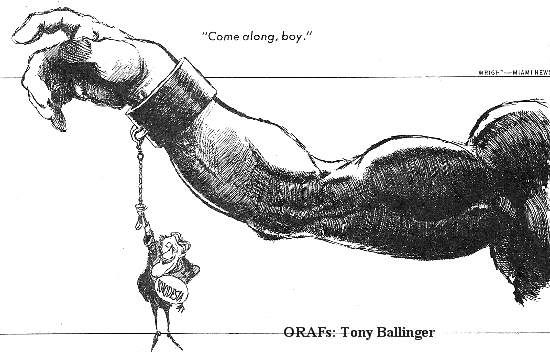
Though whites in Salisbury do not like to admit it. Rhodesia is already at war along its entire 800-mile border with Mozambique, from the Zambezi River in the north to the Limpopo in the south. Local villages have been terrorized by black guerrillas, buildings burned, cars ambushed on lonely roads in broad daylight, buses blown up by mines. Army helicopters hunt guerrillas in scrubland and forested hill country along the frontier, and patrols in brown and green camouflage probe cautiously through the brush, automatic weapons at the ready. To protect themselves, white farmers have installed push button alarm systems that alert police posts in case of attack. Fierce Rhodesian Ridgeback dogs roam the grounds, and thick steel mesh covers many windows. Some have even dug sandbagged slit trenches in their yards to provide quick cover. Almost nobody drives after sunset, and evening social life has evaporated. "This is costing me a packet," says one farmer. "But there's no other life for me. My father farmed here before me, and no bloody blacks are going to drive me out."
Salisbury weekends are spent at rugby, polo, squash or cricket, bowling on immaculate greens, golfing at Royal Salisbury, or visiting the paddock at Borrowdale Race Course (where blacks have separate stands). Cocktail chitchat centers on vacation plans and where to board the dog (a current favorite is one kennel that advertises: "Our boarders are exclusively handled by European staff"). There is mild pique that plans to visit popular highland resorts near the Mozambique border must now be abandoned ("not really safe, you know "), but some relief that gas rationing has been eased. "The people over there depend on us for jobs, money and food, "says a Highlands polo player, pointing to the sprawling African townships of Highfield and Harare eight miles outside Salisbury. "They know that if they start something, we will leave and the country will collapse. They'll be in a bind without us, and the smart ones know better than to cause trouble."
In the past year, at least 3,000 black Rhodesians, many of them disillusioned teenagers, have disappeared from schools, farms and factories all over the country. They have slipped across the
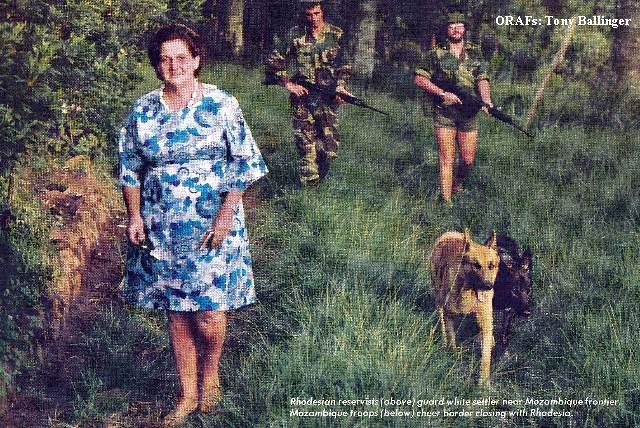
Above: Rhodesian reservists guard white settler near Mozambique frontier.
Below: Mozambique troops cheer border closing with Rhodesia.
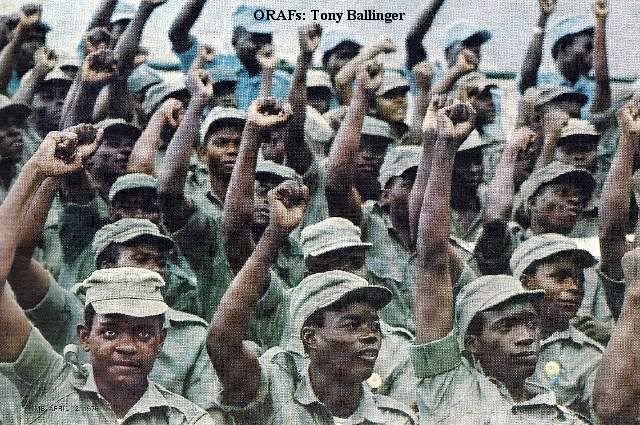
Below: Mozambique crowd with banner urging "Down with Ian Smith"
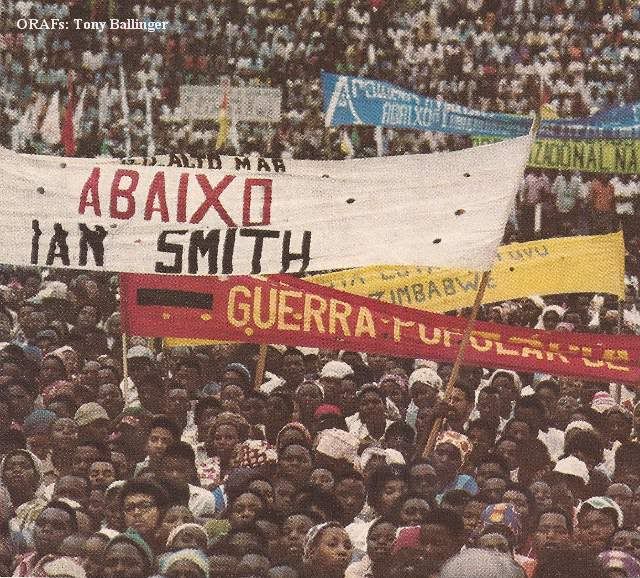
Below: Rhodesian police superintendent reviewing parade.

Below: Cadets in Rhodesian paramilitary group.
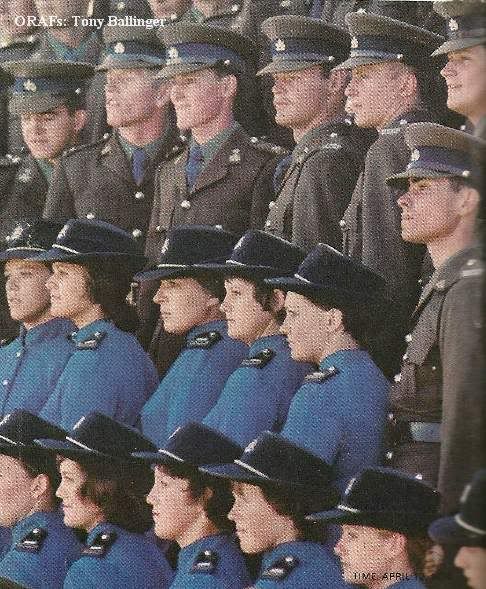
Below: Heavily armed soldier in Rhodesian army.
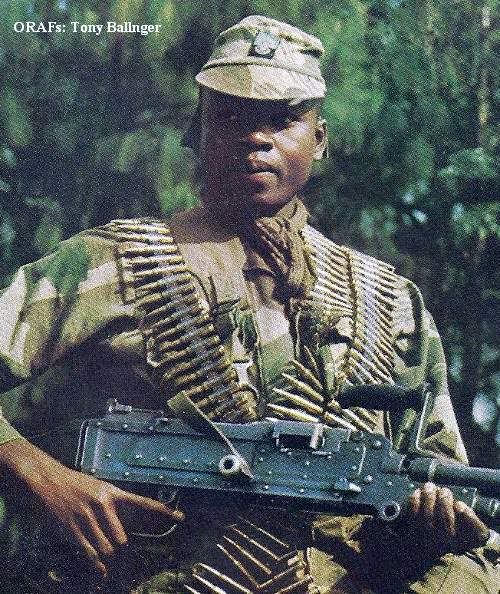
The Salisbury government professes not to be worried. But the defense budget has more than doubled in the past three years to $96.5 million, and the armed forces beefed up from 5,000 to 12.000 regulars. General mobilization could raise that to 35,000. Hundreds of foreigners—Britons. Portuguese colonials from Angola, South Africans and Americans—have also been signed on. and mercenaries are being recruited in Britain and the U.S. But the white manpower pool is stretched thin. and the military is increasingly turning to blacks, who make up more than half the army and three-quarters of the paramilitary police force. "They are absolutely first- class soldiers," says Defense Minister P.K. Van der Byl. He insists that he has no qualms about their loyalty.
Pray for Rhodesia implores a bumper sticker seen on many cars in Salisbury these days. Signs in public places warn against loose talk that might jeopardize security. Sticks and Stones may break your bones, but words can kill you reads one. A boast now, a bomb later goes another. Over lunch at the staid Salisbury Club, business and government leaders dismiss those who worry about the future as "dismal Jimmys." But many are quietly preparing what they refer to as "fallback positions," slowly salting away nest eggs abroad despite Rhodesia's stiff system of restrictions on overseas capital transfers. More houses than ever are up for sale, but there are few takers. Last year nearly 10,000 whites left Rhodesia for good. The country's white population was maintained by Portuguese immigrants from Angola and Mozambique, but today more than half the whites hold non-Rhodesian passports (mostly British and South African); less than a third are Rhodesian-born.
The government has forcibly moved more than 200.000 blacks from their ancestral tribal kraals into what are euphemistically called "consolidated" and "protected" villages. The latter, for all practical purposes, are concentration camps, with high chain-link fences, huge floodlights and constant armed patrols. Resident: are searched on entering and leaving: violators of the dusk-to-dawn curfew risk being shot on sight. The Smith government says the camps are to protect the tribes from terrorist intimidation. But many of the inhabitants are considered security risks and the camps are intended to prevent them from feeding and aiding the guerrillas. Meanwhile, the tribes people complain, their farms have been left to ruin and their cattle to die.
Constant call-ups of military reserves have made Forces Requests the most listened-to record program on Radio Rhodesia. Dedications range from tough to touching— "Give them what for. son, we 're proud of you,"— "Alt my love and kisses, darling, hurry home. " But not all the troops come home. Since January, 15 members of the security forces have been killed in skirmishes with guerrillas, and newspapers regularly carry obituaries and eulogies from comrades-in-arms in "killed on active service" columns.
Amnesty International, the London-based organization that investigates political repression around the world, last week charged that torture of blacks in Rhodesia is "now employed almost as routine practice by both police and security forces." The methods include beatings, electric shock by electrodes and cattle prods, suspension in barrels of water, threats of castration. Preventive detention of black activists has long been commonplace (three leaders—Joshua Nkomo, Robert Mugabe and the Rev. Ndabaningi Sithole—together spent 30 years in jail). At least 700 political prisoners have been held for ten years or longer, said Amnesty.
Salisbury's whites enjoy one of the highest standards of living in the world. On an average wage of $8,000 a year, they can buy a three- or four-bedroom house on an acre of land with two bathrooms and swimming pool for $46.000 and a 7.75% mortgage. The, climate is mild, taxes are low (5%), and good education is available at little cost. A decade of economic sanctions imposed by the United Nations has caused little hardship. Almost everything is available for a price, from caviar to cars to calculators. Most households employ two or three domestic servants at wages of $25 to $50 a month. Nonetheless, two in every seven white Rhodesian marriages end in divorce—the highest rate of "marital failure "in the world after Israel.
In the all-black townships of High- field and Harare outside Salisbury, the tin-roofed, cement floored cinder-block houses are packed six to the acre. Blacks are not allowed to own their own homes. Instead, they must rent them from the Salisbury city council. Only the main streets are paved and lighted, although most homes now have electricity and running water. The schools are segregated and definitely unequal. The government spent $56 per black pupil last year. $494 for
every white pupil. "We don't want to drive the Europeans out." says a black bricklayer who lives with nine relatives in a two-room house in Harare. "But they have everything and we have nothing. This is not fair. We are being cheated. Let them share the country and the money more evenly, and they are welcome to stay. But Smith will never do that, and so we will have to fight."
Crime in white Salisbury has always been low, and guerrilla terrorism has not yet touched the capital. But most whites pack a pistol in the house and some (illegally) in the glove compartment of the car. Distrust of domestic servants is growing; the woman who has a foreign houseboy from Malawi or South Africa is considered lucky. "They're, well, more dependable," says a secretary who lives in one of the newer white suburbs named, perhaps prophetically. Gun Hill.
Several arms caches have been discovered in Highfield and Harare by the newly formed PATU (Police Urban Terrorism Unit), but a police captain admits that "we probably got only the tip of the iceberg. God knows how much stuff is squirreled away out there." Black feeling has grown more militant now that the talks between Smith and Nkomo have failed. "Nkomo gave it a good go," says a black shopkeeper in Highfield, "but now he's had it. Now we will have to fight one way or the other."

Above: RHODESIA'S PRIME MINISTER IAN SMITH
"At least we'll go down first class"
Salisbury's Meikles Hotel still serves excellent Scottish smoked salmon in its elegant La Fontaine restaurant. As she nibbled at a portion last week, a well- dressed Salisbury matron was asked ifshe saw anything ominous in the breakdown of black-white dialogue. "Oh heavens, no. My servant tells me all of his people want us to stay and run the country. He's terribly trustworthy, you know."
One of the measures that embitter blacks most is the Land Tenure Act of 1970. The law divided the country in two. Rhodesia's 278,000 whites got the right to own land in the most fertile half. (Ian Smith has two 10,000-acre spreads.) The other half, often untillable bush country, went to the country's 6.1 million blacks. Today more than half the blacks live outside the cash economy. Fewer than 1 million have regular jobs. The average white wage is $8,080; the average black wage is $640. Cotton pickers are paid 35c a bag. Starting salary for black miners is 65e for an eight-hour shift. Since the right to vote is tied to income and property, blacks are effectively cut out; only 7,500 blacks v. 87,000 whites make enough to qualify.
"We've had terrorist incursions for twelve years now, and these haven't worried us," says Ian Smith. "In the past, when they came by the hundreds, they were killed by the hundreds. If in the fu- ture they come by the thousands, they will be killed by the thousands." Despairs a Rhodesian lawyer who opposes Smith's leadership: "All we can do is plead with Smith for some sense from the sidelines, but it seems we 're stuck with him."
End
Comment by Eddy norris
After all these years I wonder if the author/Time corespondent still has the same views?
Extracted and recompiled by Eddy Norris from material made available to ORAFs by Tony Ballinger. Thanks Tony
Comments are always welcome, please send them to Eddy Norris at orafs11@gMail.com
Thanks to:-
Paul Norris for the ISP sponsorship.
Paul Mroz for the image hosting sponsorship.
Robb Ellis for his assistance.
Time is slowly running out for white rule in Rhodesia. An intensive campaign by exiled guerrillas may be months off, but the chances of finding a peaceful path to equitable power sharing between the country's 278.000 whites and 6.1 million blacks now appear to be spent. Negotiations between Rhodesia's white Prime Minister, Ian Smith, and the country's leading black moderate, Joshua Nkomo, have collapsed. Britain's offer to resume transitional control of its breakaway colony, predicated on elections leading to black majority rule within two years, was summarily rejected by Salisbury.
Last week Zambia's President Kenneth Kaunda. Black Africa's most moderate spokesman, called on Britain to intervene with military force if necessary, arrest Smith and his "gang of illegitimates and replace the white government with a British-led multiracial committee including representatives of the guerrilla factions as well as respected Rhodesian whites to prepare for one-man, one-vote elections. There was little hope his plea would be heeded, but his blunt language was a clear measure of widespread African frustration about how to deal with a country that, as Time's Nairobi Bureau Chief Lee Griggs found last week, seems increasingly out of touch with reality—and with itself.
In the upper-class white Salisbury suburb of Highlands on a sunny Sunday afternoon, George and Jeanette Smith sip gin-and-tonic "sundowners" around the swimming pool behind their handsome $50,000 two-story stone home. Both are Rhodesian born and bred, in their late 30s, and not particularly prosperous by Salisbury standards. "We couldn't afford to live like this anywhere else," admits George, a junior partner in a local law firm. Like many other white Rhodesians, he has been called up for military reserve duty three times in the past year, and has had to spend 82 days away from his law practice. "Annoying business, but necessary, "he says. "I dare say it may become a bit more hairy along the border now that the talks between Smith andNkomo have broken down. But our chappies can cope with the terrorists. We all pitch in to preserve what we have here." He gestures with his glass toward the pool and the house. "You outsiders are forever comparing us to passengers on the Titanic. Well, if you're right, at least we'll go down first class."

Though whites in Salisbury do not like to admit it. Rhodesia is already at war along its entire 800-mile border with Mozambique, from the Zambezi River in the north to the Limpopo in the south. Local villages have been terrorized by black guerrillas, buildings burned, cars ambushed on lonely roads in broad daylight, buses blown up by mines. Army helicopters hunt guerrillas in scrubland and forested hill country along the frontier, and patrols in brown and green camouflage probe cautiously through the brush, automatic weapons at the ready. To protect themselves, white farmers have installed push button alarm systems that alert police posts in case of attack. Fierce Rhodesian Ridgeback dogs roam the grounds, and thick steel mesh covers many windows. Some have even dug sandbagged slit trenches in their yards to provide quick cover. Almost nobody drives after sunset, and evening social life has evaporated. "This is costing me a packet," says one farmer. "But there's no other life for me. My father farmed here before me, and no bloody blacks are going to drive me out."
Salisbury weekends are spent at rugby, polo, squash or cricket, bowling on immaculate greens, golfing at Royal Salisbury, or visiting the paddock at Borrowdale Race Course (where blacks have separate stands). Cocktail chitchat centers on vacation plans and where to board the dog (a current favorite is one kennel that advertises: "Our boarders are exclusively handled by European staff"). There is mild pique that plans to visit popular highland resorts near the Mozambique border must now be abandoned ("not really safe, you know "), but some relief that gas rationing has been eased. "The people over there depend on us for jobs, money and food, "says a Highlands polo player, pointing to the sprawling African townships of Highfield and Harare eight miles outside Salisbury. "They know that if they start something, we will leave and the country will collapse. They'll be in a bind without us, and the smart ones know better than to cause trouble."
In the past year, at least 3,000 black Rhodesians, many of them disillusioned teenagers, have disappeared from schools, farms and factories all over the country. They have slipped across the

Above: Rhodesian reservists guard white settler near Mozambique frontier.
Below: Mozambique troops cheer border closing with Rhodesia.

Below: Mozambique crowd with banner urging "Down with Ian Smith"

Below: Rhodesian police superintendent reviewing parade.

Below: Cadets in Rhodesian paramilitary group.

Below: Heavily armed soldier in Rhodesian army.

Mozambique border to join an estimated 10,000 to 15,000 rebels in the United Zimbabwe (the African name for Rhodesia) People's Army, convinced that armed struggle against the white regime in Salisbury is the only way to bring about black majority rule. There the guerrillas' anonymous 18-member high command sees that they are issued arms (usually Chinese-made AK-47 automatic rifles) and given basic training by Chinese instructors. Mozambique veterans of the decade-long guerrilla war against Portugal show them how to plant mines, lay ambushes, surround and storm farmhouses. Some 1,000 cadres have slipped back across the border to carry out terrorist raids within Rhodesia.
The Salisbury government professes not to be worried. But the defense budget has more than doubled in the past three years to $96.5 million, and the armed forces beefed up from 5,000 to 12.000 regulars. General mobilization could raise that to 35,000. Hundreds of foreigners—Britons. Portuguese colonials from Angola, South Africans and Americans—have also been signed on. and mercenaries are being recruited in Britain and the U.S. But the white manpower pool is stretched thin. and the military is increasingly turning to blacks, who make up more than half the army and three-quarters of the paramilitary police force. "They are absolutely first- class soldiers," says Defense Minister P.K. Van der Byl. He insists that he has no qualms about their loyalty.
Pray for Rhodesia implores a bumper sticker seen on many cars in Salisbury these days. Signs in public places warn against loose talk that might jeopardize security. Sticks and Stones may break your bones, but words can kill you reads one. A boast now, a bomb later goes another. Over lunch at the staid Salisbury Club, business and government leaders dismiss those who worry about the future as "dismal Jimmys." But many are quietly preparing what they refer to as "fallback positions," slowly salting away nest eggs abroad despite Rhodesia's stiff system of restrictions on overseas capital transfers. More houses than ever are up for sale, but there are few takers. Last year nearly 10,000 whites left Rhodesia for good. The country's white population was maintained by Portuguese immigrants from Angola and Mozambique, but today more than half the whites hold non-Rhodesian passports (mostly British and South African); less than a third are Rhodesian-born.
The government has forcibly moved more than 200.000 blacks from their ancestral tribal kraals into what are euphemistically called "consolidated" and "protected" villages. The latter, for all practical purposes, are concentration camps, with high chain-link fences, huge floodlights and constant armed patrols. Resident: are searched on entering and leaving: violators of the dusk-to-dawn curfew risk being shot on sight. The Smith government says the camps are to protect the tribes from terrorist intimidation. But many of the inhabitants are considered security risks and the camps are intended to prevent them from feeding and aiding the guerrillas. Meanwhile, the tribes people complain, their farms have been left to ruin and their cattle to die.
Constant call-ups of military reserves have made Forces Requests the most listened-to record program on Radio Rhodesia. Dedications range from tough to touching— "Give them what for. son, we 're proud of you,"— "Alt my love and kisses, darling, hurry home. " But not all the troops come home. Since January, 15 members of the security forces have been killed in skirmishes with guerrillas, and newspapers regularly carry obituaries and eulogies from comrades-in-arms in "killed on active service" columns.
Amnesty International, the London-based organization that investigates political repression around the world, last week charged that torture of blacks in Rhodesia is "now employed almost as routine practice by both police and security forces." The methods include beatings, electric shock by electrodes and cattle prods, suspension in barrels of water, threats of castration. Preventive detention of black activists has long been commonplace (three leaders—Joshua Nkomo, Robert Mugabe and the Rev. Ndabaningi Sithole—together spent 30 years in jail). At least 700 political prisoners have been held for ten years or longer, said Amnesty.
Salisbury's whites enjoy one of the highest standards of living in the world. On an average wage of $8,000 a year, they can buy a three- or four-bedroom house on an acre of land with two bathrooms and swimming pool for $46.000 and a 7.75% mortgage. The, climate is mild, taxes are low (5%), and good education is available at little cost. A decade of economic sanctions imposed by the United Nations has caused little hardship. Almost everything is available for a price, from caviar to cars to calculators. Most households employ two or three domestic servants at wages of $25 to $50 a month. Nonetheless, two in every seven white Rhodesian marriages end in divorce—the highest rate of "marital failure "in the world after Israel.
In the all-black townships of High- field and Harare outside Salisbury, the tin-roofed, cement floored cinder-block houses are packed six to the acre. Blacks are not allowed to own their own homes. Instead, they must rent them from the Salisbury city council. Only the main streets are paved and lighted, although most homes now have electricity and running water. The schools are segregated and definitely unequal. The government spent $56 per black pupil last year. $494 for
every white pupil. "We don't want to drive the Europeans out." says a black bricklayer who lives with nine relatives in a two-room house in Harare. "But they have everything and we have nothing. This is not fair. We are being cheated. Let them share the country and the money more evenly, and they are welcome to stay. But Smith will never do that, and so we will have to fight."
Crime in white Salisbury has always been low, and guerrilla terrorism has not yet touched the capital. But most whites pack a pistol in the house and some (illegally) in the glove compartment of the car. Distrust of domestic servants is growing; the woman who has a foreign houseboy from Malawi or South Africa is considered lucky. "They're, well, more dependable," says a secretary who lives in one of the newer white suburbs named, perhaps prophetically. Gun Hill.
Several arms caches have been discovered in Highfield and Harare by the newly formed PATU (Police Urban Terrorism Unit), but a police captain admits that "we probably got only the tip of the iceberg. God knows how much stuff is squirreled away out there." Black feeling has grown more militant now that the talks between Smith and Nkomo have failed. "Nkomo gave it a good go," says a black shopkeeper in Highfield, "but now he's had it. Now we will have to fight one way or the other."

Above: RHODESIA'S PRIME MINISTER IAN SMITH
"At least we'll go down first class"
Salisbury's Meikles Hotel still serves excellent Scottish smoked salmon in its elegant La Fontaine restaurant. As she nibbled at a portion last week, a well- dressed Salisbury matron was asked ifshe saw anything ominous in the breakdown of black-white dialogue. "Oh heavens, no. My servant tells me all of his people want us to stay and run the country. He's terribly trustworthy, you know."
One of the measures that embitter blacks most is the Land Tenure Act of 1970. The law divided the country in two. Rhodesia's 278,000 whites got the right to own land in the most fertile half. (Ian Smith has two 10,000-acre spreads.) The other half, often untillable bush country, went to the country's 6.1 million blacks. Today more than half the blacks live outside the cash economy. Fewer than 1 million have regular jobs. The average white wage is $8,080; the average black wage is $640. Cotton pickers are paid 35c a bag. Starting salary for black miners is 65e for an eight-hour shift. Since the right to vote is tied to income and property, blacks are effectively cut out; only 7,500 blacks v. 87,000 whites make enough to qualify.
"We've had terrorist incursions for twelve years now, and these haven't worried us," says Ian Smith. "In the past, when they came by the hundreds, they were killed by the hundreds. If in the fu- ture they come by the thousands, they will be killed by the thousands." Despairs a Rhodesian lawyer who opposes Smith's leadership: "All we can do is plead with Smith for some sense from the sidelines, but it seems we 're stuck with him."
End
Comment by Eddy norris
After all these years I wonder if the author/Time corespondent still has the same views?
Extracted and recompiled by Eddy Norris from material made available to ORAFs by Tony Ballinger. Thanks Tony
Comments are always welcome, please send them to Eddy Norris at orafs11@gMail.com
Thanks to:-
Paul Norris for the ISP sponsorship.
Paul Mroz for the image hosting sponsorship.
Robb Ellis for his assistance.


1 Comments:
The attempt to portray Rhodesian whites as wealthy was sheer propaganda, according to this post from a woman who was born there. http://unsanesafe.blogspot.com/2012/02/ape-territorialism-or-apologetics.html
Post a Comment
Subscribe to Post Comments [Atom]
<< Home